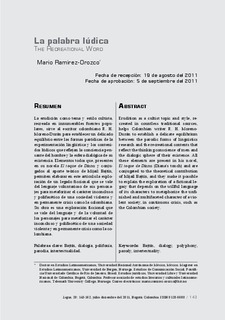| dc.contributor.author | Ramírez-Orozco, Mario | |
| dc.date.accessioned | 2012-05-18T08:40:19Z | |
| dc.date.accessioned | 2017-04-19T12:22:31Z | |
| dc.date.available | 2012-05-18T08:40:19Z | |
| dc.date.available | 2017-04-19T12:22:31Z | |
| dc.date.issued | 2011 | |
| dc.identifier.citation | Ramírez-Orozco, M. La palabra lúdica. Revista Logos. 2011, 20, p. 143-162 | |
| dc.identifier.issn | 0120-6680 | |
| dc.identifier.uri | http://hdl.handle.net/11250/2437910 | |
| dc.description.abstract | Erudition as a cultist topic and style, recreated in countless traditional sources, helps Colombian writer R. H. Moreno-Durán to establish a delicate equilibrium between the parodic forms of linguistics research and the recreational contents that reflect the thinking conscience of men and the dialogic sphere of their existence. All these elements are present in his novel, El toque de Diana (Diana's touch) and are conjugated to the theoretical contribution of Mijail Bajtín, and they make it possible to explain the exploration of a fictional legacy that depends on the willful language of its characters to metaphorize the unfinished and multifaceted character of a violent society, in continuous crisis, such as the Colombian society. | |
| dc.language.iso | spa | |
| dc.publisher | Universidad de la Salle | |
| dc.subject | dialogy | |
| dc.subject | polyphony | |
| dc.subject | parody | |
| dc.subject | intertextuality | |
| dc.subject | Bajtín | |
| dc.subject | dialogía | |
| dc.subject | polifonía | |
| dc.subject | parodia | |
| dc.subject | intertextualidad | |
| dc.title | La palabra lúdica: The recreational word | |
| dc.type | Journal article | |
| dc.description.version | Published version | |
| dc.rights.holder | © Copyright The Author. All rights reserved | |
| dc.subject.nsi | 048 | |
